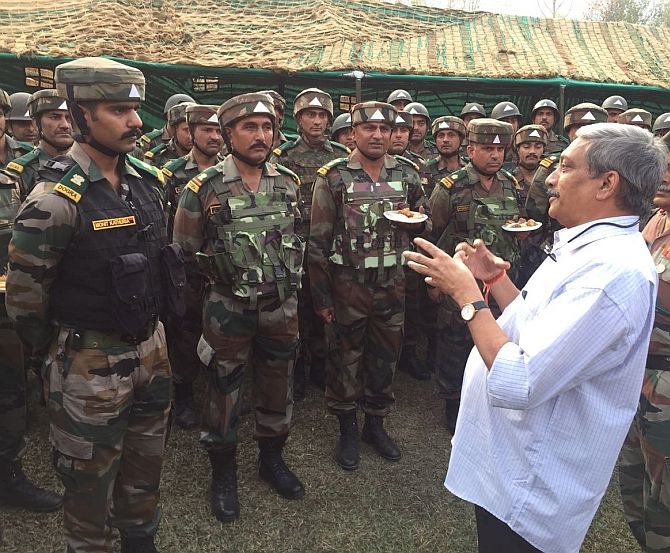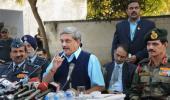'A month after assuming charge, Parrikar promised a policy within six months to "end or at least reduce" terrorist infiltration across the Line of Control.'
'However, infiltration continued apace, leading to high-profile terrorist attacks in Gurdaspur, Pathankot, and Uri.'
'During this phase, he made the controversial suggestion that India should fight terror with terror, hinting at supporting terror groups to strike in Pakistan,' observes Ajai Shukla.

Finance Minister Arun Jaitley holds additional charge of the defence ministry after Manohar Parrikar abruptly moved back to Goa to cobble together a Bharatiya Janata Party government there.
Jaitley had earlier held additional charge of the defence ministry for almost six months, from May 26, 2014, when the National Democratic Alliance government was sworn in, to November 10, 2014, when Parrikar moved in from Goa.
Nor did Parrikar give defence his undivided attention, seemingly preparing for the last 28 months to return to Goa.
Almost every Friday, he would fly to Goa, nurture his pocket borough all weekend, and return to Delhi on Monday morning.
Parrikar liked to say that, as a technologist from the Indian Institute of Technology, he was equipped to be defence minister. Yet, he also proved himself to be a skilled politician who understood the benefit of nurturing a secure political base.
During Parrikar's tenure as defence minister, his successor in Goa, Laxmikant Parsekar, was little more than a placeholder. Parrikar cleared most major decisions relating to Goa and also retained close links across Goa's political spectrum.
These relationships make Parrikar essential in a situation where the BJP, which won only 13 seats in the 40-member assembly, is upstaging the Congress that won 17 seats.
Requiring the support of eight non-BJP members of the legislative assembly for a majority, Parrikar won over two smaller parties, the Maharashtrawadi Gomantak Party and the Goa Forward Party with three MLAs each, and also two Independent MLAs.
Underlining Parrikar's stature and influence in Goa, these swing MLAs offered to support the BJP only if Parrikar were appointed chief minister.
Compared to this deft political manoeuvring, Parrikar can boast of less success as defence minister.
While deserving credit for backing indigenisation unstintingly, Parrikar was unable during his truncated tenure in office to push through procurement reform, make up even the most glaring of the equipment deficiencies that hamstring the military's operational capability, or galvanise private defence industry to 'Make in India,' creating jobs and technological capability.
Even so, Parrikar is esteemed by defence industry, including private Indian firms and global majors.
Unlike the Congress' A K Antony, who isolated himself from private industrialists, Parrikar made himself completely accessible to captains of industry.
Before joining politics, Parrikar had functioned as a technology entrepreneur, doing business with the Defence Research and Development Organisation. That convinced him the private sector had to be given a leading role in defence innovation and in creating jobs through galvanising manufacturing.
However, Parrikar was unable to wean away his bureaucrats (the defence ministry has five secretaries and dozens of senior officers) from their traditional coddling of the defence ministry's public sector undertakings and the Ordnance Factory Board.
The defence ministry's bureaucrats consistently resisted Parrikar's efforts to provide a level playing field to public and private industry.
Parrikar flaunted his commendable reformist streak, but invariably over-promised and then grossly overshot his time-targets.
Soon after assuming charge, Parrikar publicly promised a new 'blacklisting policy' within a month, in which offending vendors would be targeted with heavy financial penalties, rather than blanket bans on dealings with the MoD.
Two years later, a watered-down blacklisting policy was issued, but without clear financial penalties and with no buy-in from the MoD bureaucracy. The defence minister must take all blacklisting decisions.
A month after assuming charge, Parrikar promised a policy within six months to 'end or at least reduce' terrorist infiltration across the Line of Control. However, infiltration continued apace, leading to high-profile terrorist attacks in Gurdaspur, Pathankot, and Uri.
During this phase, he made the controversial suggestion that India should fight terror with terror, hinting at supporting terror groups to strike in Pakistan.
Criticism seldom dented Parrikar's self-confidence, with the minister insisting: 'Once you have good intentions, there can be no questions about the quality of (your) judgement.'
Parrikar immodestly proclaimed himself good at understanding complicated matters, isolating key issues and arriving at the right decision.
Yet, Parrikar's failures stand out.
The most notable has been in the realm of 'Make in India' -- the raising of indigenous manufacture in order to raise employment.
Prime Minister Narendra Modi himself stated several times that defence manufacture would be one of the pillars of 'Make in India.'
Yet, opposition from his bureaucrats held back Parrikar's 'strategic partner' policy -- in which the MoD assesses and nominates Indian private firms as automatic manufacturing partners and technology recipients for different realms of equipment, such as aircraft, helicopters, tanks, etc.
Consequently, global aircraft vendors like Boeing and Saab, eager to manufacture their fighters in India, do not know whom to partner, since no SP has been nominated by the MoD.
Yet, bureaucrats steadfastly oppose the SP policy, since nominating a company would open them to charges of favouritism and, perhaps, investigation.
Similarly, Parrikar failed to deliver on his oft repeated promise to simplify and expedite procurement, and to produce a simple, short, easy-to-implement defence procurement policy that would allow the military to quickly make up glaring equipment deficiencies.
The DPP-2016 that has been issued is as verbose and procedure driven as its seven previous versions.
And buying equipment remains problematic, as evident from the MoD's surrender of unexpended capital allocations at the end of each year.
Defence industry is abuzz with speculation about who will replace Parrikar.
Despite his shortcomings, Parrikar's penchant for interaction had given him a multi-dimensional perspective of the problems facing the defence industry.
The next defence minister, who will take over from Jaitley, will start a learning process afresh.
Don't miss the MUST READ features in the RELATED LINKS below...










